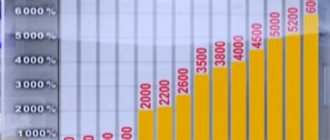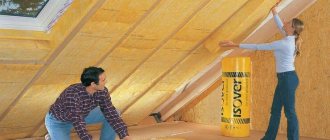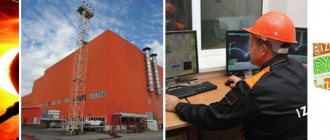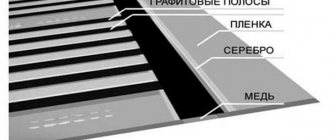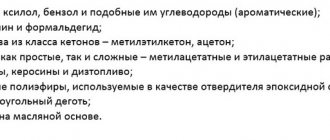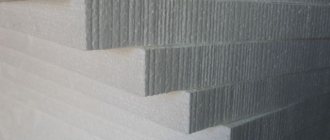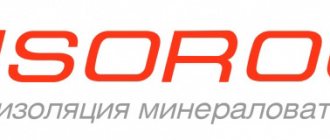Variety of TechnoNIKOL insulation materials
Thermal insulation of domestic manufacturers is represented by two main classes of insulation: mineral wool and extruded polystyrene foam .
TechnoNIKOL mineral wool consists of the finest threads of rocks. Between the weaves of basalt there are air cells. This combination provides excellent performance. Stone threads are responsible for the strength and fire resistance of the material, and many air cells give basalt slabs the necessary heat capacity .
Extruded polystyrene foam (EPS) is produced by combining styrene with special foaming additives. All components are mixed under high heat and pressure. The prepared mass is passed through an extruder - the output is slabs with a smooth surface .
Competitive advantages of EPS: light weight, ease of installation and rigidity . Excellent strength characteristics make it possible to use polystyrene foam in areas where a soft thermal insulator is not suitable. The disadvantages of EPS are flammability and the release of acrid smoke when burning.
A large assortment will help you find a worthy place for mineral wool in the insulation system of your home
Mineral wool insulation has a fibrous structure, fiber density is one of the most important characteristics that determine the quality of insulation
Although, why, actually, for a “country house”.
The characteristics of mineral wool insulation are such that they allow it to be used in many situations where heat preservation and thermal insulation are necessary:
- Firstly, we can generalize the application for insulation of building structures and talk about heat and sound insulation of any structures and any profile and slope in buildings of any type.
- Secondly, high-strength mineral wool is quite suitable for external insulation over plaster.
- Thirdly, the insulation in question is ideal for use in suspended ventilated facades (see also the article Technology for insulating facades with mineral wool. We do it ourselves).
- Fourthly, in complex insulation systems with many layers, as one of the insulation layers. An example is layered masonry, three-layer sandwich panels with mineral wool insulation and metal sheathing.
- Fifthly, for thermal insulation of industrial equipment of any range of purposes - from pipelines and tanks of local heat supply networks to main oil and gas pipelines.
- Sixthly, as a soundproofing layer on objects for any purpose, including for creating sound screens.
- Seventh, to provide additional fire protection.
The ideal protection against heat loss in pipes is mineral wool insulation - your only task is to select the insulation cylinders to match the diameter of your pipe
Advantages
Such widespread use of mineral wool is due to its very high characteristics:
- The most important thing, which is why all the fuss flares up, mineral wool has high heat and sound insulation (see also the article Rocklight insulation - a universal means for thermal insulation of rooms);
- Then, this material is very resistant to temperature influences;
- And, as a result, it is non-flammable, which is especially important in light of the latest unimaginable fires with hundreds of deaths. Moreover, this material is often used for fire protection;
- In addition, mineral wool is highly resistant to chemicals;
- It practically does not collect moisture;
- But it has excellent vapor permeability, the best among all insulation materials;
- Mineral wool has very low shrinkage and is able to maintain its original dimensions throughout the entire period of use;
- Ease of handling allows you to easily carry out all the work that often requires just a sharp knife.
This multi-layer structure, based on mineral wool as insulation, is an ideal method of insulation. Please note that the insulation is not laid directly on the working surface of the wall, but on a thin layer of plaster
Flaws
The characteristics of mineral wool insulation are really worth paying close attention to.
But there are also disadvantages:
- When it is said that mineral wool retains its composition and shape throughout its entire service life, this is very close to the truth, but under one condition - it does not contain synthetic fillers. If they are present in cotton wool, there is a high probability of them melting at temperatures above 200 degrees.
- After much debate, it was officially confirmed by both the American Building Sanitation Agency and a similar agency of the European Community that mineral wool is harmless to health and, in any case, is not a source of carcinogenic diseases.
However, handling it during work requires very careful handling; do not raise dust, which is already abundant on the construction site; work only in respirators and special clothing, and gloves are a must.
Which insulation is better than polystyrene foam or mineral wool on the outside of a building is decided largely on the basis of experience and technological capabilities. But in any case, external protection of cotton wool requires more thorough
Types and characteristics
The range of mineral wool is quite diverse and can satisfy the needs of even the most demanding consumer.
"Rocklight"
This type is characterized by low weight and standard dimensions of minislabs, as well as a low content of formaldehyde and phenol. Due to its durability, the material is widely used for insulation of country houses and cottages , allowing for a long time without worrying about repairing thermal insulation.
The slabs are suitable for finishing vertical and inclined surfaces and can be used to insulate attics and attics. The material has excellent vibration resistance and is neutral to alkalis. The slabs are not of interest to rodents and insects and are not prone to fungus.
“Rocklight” is distinguished by high thermal resistance: a 12 cm thick layer of mini-slab is equivalent to a thick brick wall 70 cm wide. The insulation is not subject to deformation and wrinkles, and during the freezing-thawing process it does not settle or swell.
The material has proven itself well as a thermal insulator for ventilated facades and houses with siding finishes. The density of the slabs ranges from 30 to 40 kg/m3.
Technoblock
More dense and incompressible (compared to those listed) mineral wool slabs with a low phenol content in the binder.
- similar to Technoacoustic slabs, they provide both thermal insulation and noise protection;
- can be used to construct layered wall masonry (unlike expanded polystyrene, these boards are vapor-permeable), both with and without an air gap, as well as frame walls.
"Technoruf"
High-density mineral wool designed for insulation of reinforced concrete floors and metal roofing. Sometimes used to insulate floors that are not equipped with a concrete screed. The slabs have a slight slope, necessary to drain moisture to the drainage areas, and are covered with fiberglass.
"Technovent"
A non-shrinking board of increased rigidity, used for insulation of ventilated external systems, and also used as an intermediate layer in plastered facades.
"Technoflor"
The material is intended for insulation of floors subject to severe weight and vibration loads. Indispensable for arranging gyms, production workshops and warehouses. The cement screed is poured over the mineral slabs. The material has low moisture absorption and is often used in combination with a “warm floor” system.
"Technofas"
Mineral wool used for external heat and sound insulation of brick and concrete walls under plaster.
Technoacoustic
Plates with a special arrangement of mineral fibers, providing a high level of sound absorption. In addition to non-flammability and moisture resistance, the following should be noted:
- the main scope of application is the arrangement of sound insulation of frame partitions, suspended ceilings and ceilings between floors with laying on joists, without load;
- can be used both in apartments and office premises;
- the material has a low compressibility index, which allows it to work without shrinkage as part of vertical structures for 50 years or more.
"Heat roll"
Rolled material with high sound insulation properties and having a width from 50 to 120 cm, a thickness from 4 to 20 cm and a density of 35 kg/m3. It is used in the construction of private houses as a thermal insulator for pitched roofs and ceilings.
Basalt wool: properties and purpose of different types
Mineral wool insulation is in demand at different stages of thermal insulation of premises. The material is especially popular in the construction of prefabricated structures - its qualities meet all the requirements and standards of frame housing construction .
Distinctive characteristics
TechnoNIKOL stone wool is made of basalt. Processed rock, special production technology and binding components endowed the heat insulator with a number of advantages:
- fire safety – class of non-combustible materials;
- excellent thermal efficiency;
- resistance to chemical influences;
- wide operating temperature range – from -60°С to +400°С;
- vapor permeability - quality is especially important for the walls of a frame house; proper installation of mineral wool prevents the appearance of the “thermos effect”;
- moisture resistance;
- insignificant content of harmful substances – binding components no more than 2.5%;
- moderate elasticity and resilience.
TechnoNIKOL produces slabs of different sizes, the thickness of the mats is standard - 50 mm and 100 mm . The parameters of insulation depend on the density of the heat insulator and its purpose. Let us denote the average characteristics of stone wool:
- thermal conductivity – 0.035-0.039 W/m*C;
- water absorption – within 1.5-2%;
- density – 25-50 kg/m3;
- vapor permeability – 0.3 mg/(m*h*Pa);
- compressibility - up to 8-55%, the indicator depends on the density of the material.
Materials for pitched roofing
On the official website, for the convenience of customers, the manufacturer has arranged materials according to their scope of application. For pitched roofs, low-density mats are suitable , since it is assumed that the load on the roof will be small.
Solutions from TechnoNIKOL:
- Rocklight. Universal slabs for private construction. Density of TechnoNIKOL Rocklight – 30 kg/m3, compressibility – 30%, dimensions – 120*60 cm. Suitable for inclined, vertical structures that do not bear external load. The binding component is a resin with a low phenol content. This composition allows Rocklight to be used for internal thermal insulation .
- Heat roll. Long mats of stone wool insulation, wound into a roll. Density is 30 kg/m3, and compressibility is within 50%. Dimensions – 4*1 m, thickness – 50/100 mm. The material is suitable for laying on pitched roofs and other inclined surfaces.
- Technoblock Standard. The increased density (45 kg/m3) allows the slabs to be used not only for insulating frame roofs, but also for thermal insulation of layered masonry, frame-type walls and facades with a ventilation gap.
- Technolight Optima. The average density is 35 kg/m3. The scope of application is limited to buildings and structures without significant loads. Can be used as the first internal layer of thermal insulation in the construction of ventilated facades .
- Technolight Extra. The slabs have a very low percentage of moisture absorption - no more than 0.5%. Density indicator – 30 kg/m3. The material perfectly resists compression and can be used as a facade heat insulator under siding .
Useful: Tool for building a frame house
Facade works
A line of thermal insulators has been developed for walls. The choice depends on the cladding technology. TechnoNIKOL Technofas is used for plaster; Technoblock Standard and Technovent are used for ventilated facades.
Technofas. A distinctive feature of the series is the high density of basalt insulation. The indicator for different materials is within the range of 105-145 kg/m3. Hydrophobized slabs can withstand the load of the plaster layer and are neutral to concrete mortar .
Technovent. For a ventilated facade, strength characteristics are not so important. The density of Technovent slabs is 36-75 kg/m3. Technovent N (36 kg/m3) is used as an inner layer, and Technovent Extra (75 kg/m3) can act as a second material when installing two-layer insulation.
Technovent N can be replaced with Technoblock Standard - their parameters are largely similar. The final choice is often made based on how much the insulation costs. In this regard, Technovent N has an advantage.
Noise-absorbing sound insulation
TechnoNIKOL Technoacoustic slabs have a special purpose. These are mats with a special structure of mineral fibers, providing an excellent level of sound absorption . Basalt insulator is capable of absorbing up to 60 dB of noise.
The main area of application of Technoacoustics is sound insulation of frame partitions, arrangement of sound recording studios . The boards are also suitable for residential and office use. The density of 40 kg/m3 allows them to be used in ventilation facades. However, they are in little demand there due to their high cost - there are more affordable alternatives.
Insulation of floors and flat roofs
These structural elements are subject to greater loads, which means that the requirements for the mechanical strength of the insulation are higher. For floors and flat roofs, the company sells a separate series of heat insulators - Tekhnoruf. Release form – dense mats with dimensions 120*60 cm, thickness – 30/40/50/100 mm. Products differ from each other in density, an indicator of compressive strength.
Representatives of the series:
- Tekhnoruf 45 – density 140 kg/m3, compressive strength – 45 kPa, organic content – up to 4.5%;
- Tekhnoruf V 60 – high density 180 kg/m3, strength index – 60 kPa;
- Tekhnoruf N 30 – density 115 kg/m3, strength – 30 kPa;
- Tekhnoruf N Extra - at a density of 100 kg/m3, the strength is 30 kPa;
- Tekhnoruf Prof – density 160 kg/m3, strength characteristics – 60 kPa.
Tekhnoruf N 30 is intended for laying the bottom layer with a two-level thermal insulation scheme for a flat roof in coverings made of metal profiles or reinforced concrete. The remaining materials can withstand direct significant loads ; they can be installed as the main thermal insulation layer under roofing “pies” of all types.
Useful: Choosing the best insulation for a frame house
Extruded polystyrene foam - application features
Expanded polystyrene insulators are combined into one series - Carbon. The materials have similar characteristics, but differ in release form. The type of execution largely determines the scope of use of EPS.
Material characteristics
The insulation is produced by extrusion. As a result, many sealed cells are formed. The composition and structure of expanded polystyrene endowed the heat insulator with the following properties:
- Low thermal conductivity. An indicator of 0.028-0.035 W/m*C puts the material among the leaders in terms of thermal efficiency.
- Hydrophobicity. EPS does not absorb moisture and retains its characteristics in a humid environment.
- Moderate combustion. The use of carbon made it possible to minimize the flammability of polystyrene foam - when the material melts, burning drops do not form .
- Insulation thickness – 20-120 mm. The choice depends on the area of use.
- The thermal insulator is resistant to fungus, mold, and pests.
- The operating temperature range is comparable to that of basalt insulation - from -50°C to +75°C.
Weaknesses of EPPS: vulnerability to gasoline, solvents, UV rays, fire.
Carbon: variety of product items
Types of extruded polystyrene foam TechnoNIKOL Carbon:
- Eco - slabs of various thicknesses (20-100 mm) for insulation of low-rise buildings and cottages.
- Drain – one side of the EPS has drainage grooves. The holes provide improved ventilation when insulating a flat roof or draining rainwater when insulating a foundation.
- Eco Fas – arrangement of house plinths, plastered facades. Milling on the outside ensures good adhesion to various surfaces.
- Eco SP – suitable for insulating foundations using the Swedish plate method. The foundation includes communications and a floor heating system. Eco SP has increased rigidity and very low thermal conductivity .
- Prof – maximum strength. Application – insulation of floors on the ground, various foundations, flat roofs.
- Prof Slope is a combination of five slabs forming a wedge-shaped insulation.
- Solid – high strength due to closed cells. Used on an industrial scale: insulation of highways, floors under load, railway tracks.
Helpful information
Fused roofing is a rolled roofing and waterproofing material, which is produced on the basis of rot-resistant fabric and is used for the manufacture of roofing carpets for various buildings and structures, as well as for waterproofing bridges, foundations, and tunnels.
Fused roofing
One of the most inexpensive and effective methods is horizontal waterproofing of walls . To implement this, the walls are trimmed in a horizontal plane, after which the resulting gap is filled with waterproof material. Another method is to inject liquids that block the capillaries or make their walls hydrophobic.
Waterproofing walls
Major roof repairs involve a number of actions:
- removal of old roofing;
- repair of a wooden or metal structure that serves as a load-bearing roof, and, if necessary, its replacement;
- antiseptic and fire-retardant treatment of the supporting structure;
- if the integrity of the vapor barrier is compromised, restoration;
- restoration of thermal insulation;
- roofing installation;
- if necessary, paint the roof.
Major roof repairs
There are signs by which you can determine the condition of the roof and decide whether a roof replacement .
Inspect the roof - what does it look like? Does this roof match the architecture of the building as a whole? Perhaps you would like to make your home more stylish and modern, or maybe, on the contrary, restore its former appearance? Often, replacing a roof can greatly change the entire appearance of a building.
Roof replacement
Wall insulation is carried out both outside and inside the building.
Using external wall insulation devices you can:
- protect the wall from various atmospheric influences, for example, freezing and thawing;
- move the dew point to the outer thermal insulation layer, thereby avoiding dampness of the inside of the wall;
- eliminate the appearance of cracks in the main mass of the wall, thereby increasing the durability of the walls;
- create a favorable mode of functioning of the wall according to the conditions of its vapor permeability;
- create a favorable indoor microclimate;
- improve the appearance of facades.
Wall insulation
Mineral wool is a fibrous material that is obtained from rock melts, as well as metallurgical slags and their mixtures. Most often, global manufacturers of mineral wool products use rocks as raw materials. Thanks to this, the mineral wool is of high quality and can be used for a long time. When durable and reliable operation of buildings and structures is required, this type of mineral wool is usually used.
Mineral wool
Extruded polystyrene foam (or extruded polystyrene foam) is a new word in the field of thermal insulation technologies. Even though the material began to be produced more than 60 years ago, it still has no analogues either in Russia or in the world. TECHNONICOL expanded polystyrene is a universal insulation material in all respects.
Extruded polystyrene foam
When choosing roofing materials for your home, you need to consider the advantages and disadvantages of each of the coatings offered on the market today. A high-quality roof is a guarantee of protecting the premises from any weather. Roll roofing materials today are very popular in the construction of not only industrial but also residential buildings. Roofs made from roll materials are lightweight, highly reliable and cost-effective.
Roofing carpet is produced in rolls; installation is carried out in two layers, with the top layer being covered with a special protective coating.
Roofing materials
Flat roofing is one of the most common options for arranging the roof of both residential and industrial buildings. Affordable price, light weight, the ability to get additional roof space, simplicity and convenience of installing a flat roof - all this makes it popular and in demand.
Flat roof installation
The temperature on the floor surface is an important indicator of the comfort level of a home. This is why floor insulation is necessary for any living space. If a residential building is located in close proximity to the ground, if the general heating of the house leaves much to be desired, if for some other reason the floors in the house are cold, thermal insulation of the floors is needed. Thanks to this, you can achieve two goals at once: increase the comfort of the room and reduce heating costs.
Floor insulation
In the modern market of roofing materials, roofing mastic is in increasing demand. It is a liquid viscous homogeneous mass, which, after application to the surface and hardening, turns into a monolithic coating. The most common use of roofing mastic is the installation and repair of roofs, as well as waterproofing.
Roofing mastic or bitumen-polymer mastic
Solving “typical” problems and issues that arise during the installation of roofing and waterproofing.
Our solutions
Modern construction cannot be imagined without thermal insulation. At the same time, even the highest quality insulation material will not be able to function effectively enough if it is not protected by a properly installed vapor barrier.
Vapor barrier
Insulating a home from outside noise is primarily about acoustic comfort, allowing residents to hear only the sounds they want and protecting themselves from unwanted sounds from outside. In addition, the soundproofing of the apartment also provides reliable thermal insulation. It includes not only insulation of floors and walls from extraneous sounds, but also soundproofing of doors and partitions.
Soundproofing the apartment
Popular materials for waterproofing today are roofing membranes. The rapid growth of their popularity is due to their excellent user and technological properties. Firstly, PVC roofing membranes are very durable, usually lasting about 50 years.
Roofing membranes
The climatic features of Russia are such that it is often necessary to spend large amounts of money on heating buildings and maintaining heat in them. The Russian economy is developing today in the direction of saving fuel and energy resources. One of the successful options for solving the problem of heat conservation is thermal insulation of pipelines.
Pipeline insulation
Roofing felt is a roofing roll waterproofing material, which is obtained by impregnating roofing cardboard with petroleum bitumen and covering the upper and lower surfaces of roofing felt with a layer of refractory bitumen.
Ruberoid and its varieties
Roof waterproofing is a necessary measure that performs an important function: it protects the roof from the negative effects of moisture and water-salt solutions. If you do not take care of roof waterproofing in a timely manner, humidity and precipitation will cause rapid wear of the roof. As a result, you will have to carry out expensive roof repairs.
Roof waterproofing
Innovative PIR insulation TechnoNIKOL
The mats are made of polyisocyanurate foam. The structure of the plates is hermetic cells, the external insulation is covered with a layer of foil. This solution improves thermal efficiency - the thermal conductivity coefficient is reduced to 0.021 W/m*C. An innovative polymer is used to insulate the fuel tank of rockets.
A 1.6 cm layer of PIR insulation is equivalent in thermal efficiency to a 1.34 m concrete wall.
Polyurethane is considered the toughest elastomer - a compressive strength of more than 120 kPa. The excellent characteristics of insulation make it popular when installing flat roofs. Reviews about PIR insulation are positive - the material is lightweight, easy to install, durable, and the aluminum layer increases its fire resistance.
Technonikol products are in active demand. Main advantages: wide range of choice, high quality and loyal pricing policy.
Areas of application of TechnoNIKOL products
There are a huge number of thermal insulation materials from TechnoNIKOL on the market. Each type has its own characteristics, and when purchasing, you should take them into account in accordance with the needs and place of use.
A huge number of positive qualities have contributed to the popularity of these materials among consumers, in particular due to the durability and high quality of products in general. TechnoNIKOL mineral wools have enormous technical thermal insulation properties and perfectly protect rooms from extraneous sounds from the outside, so they are often used when arranging:
- interfloor ceilings and roofs
- interior partitions and wall frames
- ventilated facades
- mansard roofs
- floors, even equipped with heating and other things.
Numerous positive characteristics indicate the superiority of Technonikol insulation compared to other materials that are designed to suppress extraneous noise and provide thermal insulation. Mineral wool has proven itself positively in the market, because it is excellent not only in efficiency, but also in cost, which is several times lower than analogues with the same properties.
Installing mineral wool is a fairly easy process, and if desired, you can do it yourself without involving additional specialists.
Currently, the market for thermal insulation materials offers a wide range of mineral wool materials. One of the first places in popularity is occupied by insulation from the TechnoNIKOL company.
The TechnoNIKOL company is one of the five largest manufacturers of thermal insulation materials, and is a leader in technological innovation and a large Russian manufacturer of mineral wool.
Now buying insulation from the manufacturer TechnoNIKOL is one of the most reasonable decisions.
Specifications
Physical and mechanical characteristics determine the suitability of a particular material for the specific needs of the buyer. The slabs differ in strength, slope, thickness and cost.
Fire resistance
Most insulating materials are non-flammable. The flammability group of raw materials has its own marks. For example, “Pir” thermal insulation boards for bathhouses and balconies are marked with the G4 mark. Materials with a lining of fiberglass and foil have indicators G1 and G2.
Extrusion varieties “Eco” and professional insulation with carbon have indicators G 3 and G4. In this case, smoke generation and flammability are marked with D3 and B2. Techno stitching materials are a non-flammable type of heat-insulating material for any material thickness (from 30 to 80 mm). Options based on basalt and basalite sandwich are marked NG (non-flammable).
Thermal conductivity
The performance of each material is different. For example, the thermal conductivity level is:
- technical heat insulators – 0.037-0.041 W/mS;
- extrusion analogues in the form of plates – 0.032 W/mS;
- thermal insulation boards “Pir” – 0.021 W/mS;
- analogues based on basalt – 0.038-0.042 W/mS;
- options for shipbuilding – 0.033-0.088 W/mS.
Product brands
XPS TechnoNIKOL. It has very low thermal conductivity. It is produced in the form of slabs with a thickness of two to ten centimeters.
Technofas Effect. Used for insulation of external walls.
Teplorol Technoblock. These are universal materials that differ only in their sizes.
Technoacoustic. Special plates with increased density. They are ten centimeters thick. Can be used for both insulation and sound insulation.
Technovent. Insulation for outdoor use. It is used for insulation of facade systems, as it has special air gaps.
Technolight. Special lightweight slabs.
Technoruf. Used for finishing roofs.
The main characteristics of TechnoNIKOL insulation differ slightly from each other. They mainly differ in size and material density. TechnoNIKOL insulation is most often produced in the form of slabs of different sizes.
TechnoNIKOL insulation has the following dimensions: width from five hundred to six hundred millimeters, thickness depends on the material and can be from twenty to two hundred millimeters.
Release form
The company offers two types of insulation: in rolls and in the form of sheet material. The second type is thermal insulation made from sheets in the shape of rectangles. For ease of transportation, they are sold in packages of several pieces. The number of sheets in a pack may vary. This depends on the thickness of the insulation and its composition.
For the convenience of the buyer, the manufacturer indicates the number of square meters on the label. This allows you to cover rolled or sheet material taking into account the specific parameters of the base.
Stone wool: application
Cotton wool insulation is used in the construction of baths, saunas, swimming pools, and when laying communications, wells and air ducts. It is even placed in the foundations of houses.
Depending on where the insulation will be used and what load it will bear, it is divided into classes:
- Soft. Suitable for laying wells and ventilated walls.
- Semi-rigid. Suitable for walls in multi-storey buildings, for thermal insulation of pipes.
- Hard. Used in foundations, floors.
Dimensions
In addition to the fact that the dimensions of roll and tile materials are different, the brand provides a flexible approach to each client. Upon individual order, the insulation can be produced in a different format convenient for the customer. The dimensions of standard slabs are 1200x600x100, 1200x600x50 mm. The thickness of the material varies on average from 1 to 15 cm. The sizes of varieties with an edge are 1185x585, 1190x590 mm with a width of 20, 30, 40, 40 mm. The length range is from 600 to 12000 mm, the width ranges from 100 to 1200 mm.
How to choose insulation
In the process of choosing a thermal insulation material, regardless of the manufacturer, the user should pay attention to a number of criteria. They will allow you to choose the right insulation, taking into account the climate zone and external natural factors. Therefore, the following requirements are set for the selected material.
- Thermal insulation level. This criterion must correspond to a particular climatic zone, as well as the material of the insulated surface itself - is it wood or brick, blocks, and so on.
- The weight of the insulation itself - the lower it is, the greater the savings on fastening, the less weight is given to the wall, the foundation of the building itself.
- The level of vapor permeability - the indicators here should be high, as this will ensure the removal of moisture and the walls will always be dry.
- Long years of service. You should not choose a material that will last only 5-8 years - at least 25 years.
- Environmental friendliness indicators are also important, when the insulation does not release harmful and poisonous compounds into the air.
- Resistant to ultraviolet radiation, as well as insects, such as bark beetles or rodents.
- The material itself must have low flammability.
- Moisture absorption. The indicator should not exceed 30 to 60%.
Important! And the last criterion is the cost of insulation. According to general standards, the cost of insulation should not be more than 10% of the total cost of building a house.
Mineral wool
This material is a structure of small fibers and air. Mineral wool is made from rocks. There are large layers of air between the fibers. Thanks to this, the material has excellent thermal insulation properties.
The cotton wool from Teplonikol shows high performance not only in cold weather, but also in hot weather. Indicators and features of mineral wool:
- This is a fire-resistant insulation that will not catch fire even at a temperature of 1000 ºС. If a fire suddenly starts, the material will not even melt. This feature helps to avoid destruction of the building in case of fire.
- Mineral wool slabs can be classified as environmentally friendly products. Fungus and harmful bacteria cannot grow in them. Rodents also cannot harm the finish.
- During use, basalt fiber does not emit substances that are harmful to humans and the environment. Even at high temperatures, such cotton wool remains completely safe.
Installation features
Among the popular methods of insulation, craftsmen use two techniques - wet and dry facades. The method of insulating a wet facade involves the presence of wet materials during the finishing itself - adhesive mixtures and plaster, and so on. The technology of this type of installation using the wet method is as follows.
The insulation itself is simply attached, so to speak “set” on the adhesive mixture. Then they are fixed using umbrella dowels. This will allow the material itself not to deform during operation and not slide off the wall itself. In terms of dowel consumption, at least 5 pieces must be used per square meter of area. After this, a special reinforcing mesh is attached to the top and again covered with a layer of glue, then primed with special compounds. The work is completed by applying a layer of decorative plaster and painting.
Advantages and disadvantages
Manufacturing facility .
Any material has its pros and cons, without considering which its characteristics will be incomplete. Let's start with the positive qualities.
Mineral wool resists fire well.
Advantages of TechnoNIKOL cotton wool:
- Basalt raw materials . Cotton wool is produced only from high-quality raw materials of the gabbro-basalt group, as a result the material does not burn, does not cause allergies, and has good technical characteristics;
When insulating the floor, the slabs are laid between the joists.
- High quality binder . Any slabs made of mineral fibers are impregnated with organic resins containing phenol and formaldehyde. TechnoNIKOL uses only high-quality resins in which these dangerous toxins are bound and are not released;
The fibers do not cause itching or allergies.
- A wide range of . You can choose the insulation that is best suited for your purposes. The manufacturer is constantly expanding its product range for your convenience;
Good noise absorption makes it possible to lay gypsum plasterboard material for filling walls.
- Precise geometry . Mats and especially slabs have clearly defined dimensions, which are maintained from product to product with millimeter accuracy. This facilitates the calculation and installation of insulation;
The photo shows that the dense mats can support the weight of an adult man.
- Easy installation . The insulation of this brand is distinguished by the possibility of installing it yourself without the involvement of specialists. As a result, the price of insulation is much lower;
Basalt wool is successfully used for insulating facades.
- Durability . The company's products have a long service life, exceeding 50 years (subject to the conditions of use and installation).
The instructions allow you to work with mineral wool yourself, without the involvement of specialists.
Disadvantages of mineral wool:
- Dust release . Even basalt raw materials cannot completely protect against dust. Although it does not cause itching or pricking, inhaling it can be harmful to health, so it is recommended to cover the slabs with membranes;
It is better to work with mineral wool wearing gloves and a respirator.
- Vapor permeability . Although the fibers themselves do not absorb moisture, it can accumulate inside the wool in the form of steam and droplets, increasing its thermal conductivity. It is recommended to use a vapor barrier for laying slabs and mats;
- High price . Basalt wool is more expensive than any similar insulation, it is more expensive than expanded polystyrene and a number of other materials. In return you get security and good insulation.
Product Features
Technonikol insulation is a basalt material that differs from others in its unique combination of technical and physical characteristics. The main material for the manufacture of this insulation is basalt fiber.
The use of Technonikol as a thermal insulation material resulted in the availability of a set of all necessary certificates and technological certificates, as well as key features of the insulation itself:
- Has excellent thermal insulation properties.
- The material is fireproof (non-flammable), the melting point is much higher than +100 degrees.
- Resistant to aggressive chemicals.
- Provides a high level of noise insulation.
- Excellent vapor permeability and hydrophobicity.
- High level of strength.
- Safe for human health, environmentally friendly material.
- It is distinguished by its high biological resistance (rodents and insects do not like it, it is not a favorable environment for the appearance and development of mold and mildew).
- Durable and easy to use.
The material also has disadvantages:
- The following substances negatively affect the quality and structure of the material: coal tar, ethyl acetate, petroleum toluene, acetone.
- The material may deteriorate if exposed to direct sunlight.
- Over time, any mineral wool cakes. It is quite possible that in 10-15 years the insulation will already lose some of its positive properties for this reason.
The technical characteristics of TechnoNIKOL insulation comply with Russian standards for the operation of facilities and construction conditions.
- thermal conductivity of the material: about 0.03-0.04 W/mK;
- vapor permeability: 0.3 mg/mchPa;
- water absorption: up to 2%;
- compressibility: from 8 to 55%.
Thanks to its high technological characteristics, TechnoNIKOL basalt insulation has found wide application in various areas of construction, both in private housing construction and on an industrial scale.
